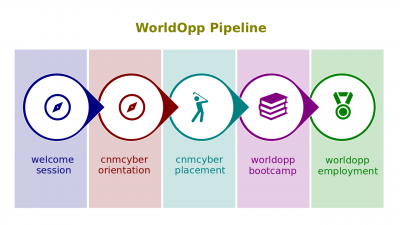Difference between revisions of "What Economy Is"
(→Key terms) |
(→Script) |
||
| Line 14: | Line 14: | ||
===Script=== | ===Script=== | ||
| − | : | + | :[[Employment]] depends on [[economy]], which is the system of human production and consumption of [[raw material]]s, goods, and [[service]]s. These systems may range from the prosperity of a single household to the wealth of nations. |
| − | : | + | :The same term, [[economy]], may also refer to the way of how wealth is generally created and used or, particularly, to the careful use and management of money, time, energy, and so on. |
| − | : | + | :Any ''economy'' may be divided in three sectors. |
| − | : | + | :The [[public sector]] represents those [[enterprise]]s that the government owns. These ''enterprises'' exist because of taxpayers' funds. In the [[United States]], the ''public sector'' includes the [[United States Federal Government]], state governments, and municipal governments. |
| − | : | + | :The [[private sector]] represents those ''enterprises'' that the citizens own. These ''enterprises'' exist because of sales to the [[customer]]s. Their size varies greatly from a single-person [[sole proprietorship]] to [[multinational corporation]]s. |
| + | |||
| + | :The [[nonprofit sector]] represents those ''enterprises'' that no one owns. Groups of people and/or [[organization]]s create these ''enterprises'' usually to address some causes. The ''nonprofit sector'' includes religious organizations, [[labor union]]s, [[professional association]]s, foundations, and so on. The [[nonprofit organization]]s may collect [[membership fee]]s or run business operations. | ||
| − | |||
| − | |||
'''[[Economy Segments]]''' is the successor [[lectio]]. | '''[[Economy Segments]]''' is the successor [[lectio]]. | ||
==Quiz== | ==Quiz== | ||
Revision as of 01:36, 4 May 2020
What Economy Is (hereinafter, the Lectio) is the second lesson part of the Industries and Specialties lesson that introduces its participants to industries, professional specialties, and related topics.
This lesson belongs to the Introduction to Employment session of the CNM Cyber Orientation. The Orientation is the second stage of the WorldOpp Pipeline.
Contents
Content
The predecessor lectio is Labor Relations.
Key terms
- Economy. The system of human production and consumption of raw materials, goods, and services, which may range from the prosperity of a single household to the wealth of nations. The term, economy, may also refer to the way of how wealth is generally created and used or, particularly, to the careful use and management of money, time, energy, etc.
Script
- Employment depends on economy, which is the system of human production and consumption of raw materials, goods, and services. These systems may range from the prosperity of a single household to the wealth of nations.
- The same term, economy, may also refer to the way of how wealth is generally created and used or, particularly, to the careful use and management of money, time, energy, and so on.
- Any economy may be divided in three sectors.
- The public sector represents those enterprises that the government owns. These enterprises exist because of taxpayers' funds. In the United States, the public sector includes the United States Federal Government, state governments, and municipal governments.
- The private sector represents those enterprises that the citizens own. These enterprises exist because of sales to the customers. Their size varies greatly from a single-person sole proprietorship to multinational corporations.
- The nonprofit sector represents those enterprises that no one owns. Groups of people and/or organizations create these enterprises usually to address some causes. The nonprofit sector includes religious organizations, labor unions, professional associations, foundations, and so on. The nonprofit organizations may collect membership fees or run business operations.
Economy Segments is the successor lectio.
